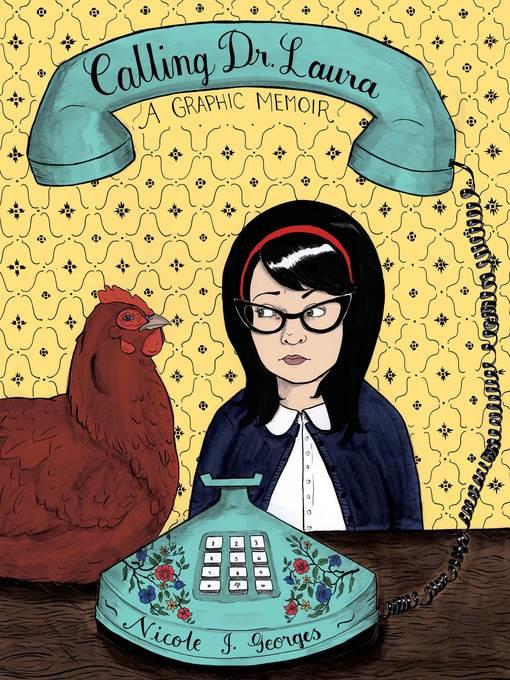
Calling Dr. Laura
A Graphic Memoir
کتاب های مرتبط
- اطلاعات
- نقد و بررسی
- دیدگاه کاربران
نقد و بررسی

August 13, 2012
The title of this twee but engaging graphic memoir overstates the role of the famous radio psychologist, who makes a mere cameo. The book is really about the author’s struggle with her secretive family and the mystery of her father’s identity. As a child, Nicole believed her father had died when she was very young. Father figures remained elusive throughout her formative years. After relocating to Portland, Ore., in her 20s, Nicole receives a palm reading as a birthday gift. The results convince her that her biological father is still alive, and she is driven to seek the truth from her fractious relatives. Amid all of this, Nicole juggles difficult romantic relationships with her decision to keep the fact that she is gay from the very same mother from whom she seeks the truth. Georges’s naïve line art and sometimes labored visual storytelling is balanced by humor and incisive characterizations. However, this ambitious family narrative could have used a stronger editorial eye. Despite her story being too long, the author approaches it with the tenacity of a detective. Among other factors—including clever asides and several terrific jokes—a deeply affecting epilogue makes Georges’s tale well worth the telling.

October 1, 2012
A meandering graphic memoir by a young cartoonist who seems to have most of her story ahead of her. The pivotal points of the narrative come nearly 200 pages apart. Early on, Georges (Invincible Summer 2, 2008, etc.) writes about a visit to a palm reader who tells her that the father she's never known, who she's been told by her mother is dead, is in fact alive. The second arrives with the title incident toward the end, after the author has found out little about her father except for the fact that he likely is alive. She makes a call to Dr. Laura on how to handle her Christmas visit with the mother she no longer trusts. There's also some subtext to this--not shared with Dr. Laura--that the author is a closeted lesbian, and her mother became estranged from an older daughter when she came out. That sister has also provided the author with testimony that her father (the younger sister's; the older sisters have a different father) is alive. The narrative lacks focus and command, skipping all over the place chronologically as well as geographically, as the author addresses her not-very-dramatic relationships with girlfriends, her series of stepfathers and would-be father figures and her reluctance to address her sexuality with her mother (much to the annoyance of her live-in lover). There are lots of animals as well, mostly dogs, but a pet chicken, too. The narrative builds to the phone call with Dr. Laura, who has been barely mentioned through the preceding 190 pages, and whose cut-to-the-chase advice is curt, cold and not very helpful. "I cut my losses and moved forward," writes Georges, in what seems to be the end of the prologue for the life to come. And then comes the epilogue, in which she (kind of) solves the mystery of her father. The mostly engaging tone and humor can't compensate for a lack of substance and continuity.
COPYRIGHT(2012) Kirkus Reviews, ALL RIGHTS RESERVED.

March 1, 2014
Georges's family is fraught with secrecy. When a psychic informs her that her father isn't really dead, as her family has told her, she uncovers more family secrets--and is understandably hesitant to reveal her own secret to her mother. Georges's quirky drawings bring to life her difficult relationship with her secretive mother, her musician girlfriend, and an amusing gang of dogs.
Copyright 2014 Library Journal, LLC Used with permission.

December 15, 2012
Alison Bechdel's Are You My Mother? (2012) explored a lesbian cartoonist's relationship with her mother, both in the past and in the present. Georges' memoir may be broadly categorized as examining similar ground in the same format, but here the memories, the mother, and the cartoonist herself bring very different details to the work, and thus provide a very different tale. Georges' quirky, big-faced, and evocative drawings, tempered by a variety of panel sizes, show the bespectacled author as she comes to terms with her mother's lies to her as a child about her father being dead; her girlfriend's impatience with the adult Georges' tolerance for her mother's intolerance; the clutch of dogs (and a chicken or three) and the stuffed animals who safeguard Georges' sense of security in both youth and young adulthood; and the attraction Dr. Laura Schlessinger offers in her pat, specific directions for relief from the discomforts of uncertainty. An excellent graphic memoir offering engaging insights for those who shareor don't shareany of Georges' worries and traits.(Reprinted with permission of Booklist, copyright 2012, American Library Association.)

























دیدگاه کاربران